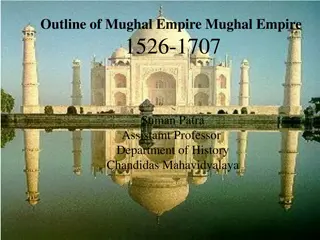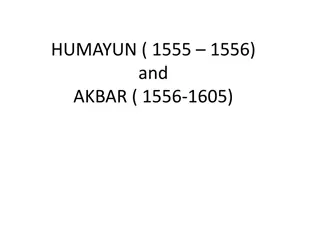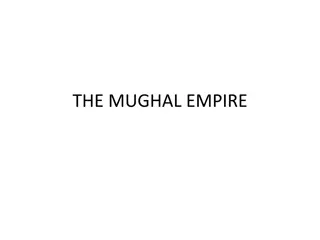AKBAR THE GREAT
After the death of Humayun, his young son Akbar assumed the Mughal throne with the guidance of Bairam Khan. Facing political unrest and enemies, Akbar's rule saw significant accomplishments, such as defeating Hemu at the Second Battle of Panipat and establishing a strong administrative system. His e
2 views • 31 slides
Outline of Mughal Empire Mughal Empire 1526-1707.
The Mughal Empire in India from 1526 to 1707 was a significant period marked by notable rulers such as Babur, Humayun, Akbar, Jehangir, Shah Jehan, and Aurangzeb. These emperors each contributed differently to the empire's development, with highlights including military conquests, administrative ref
7 views • 14 slides
The Mughal Emperors Humayun and Akbar: A Legacy of Conquest and Diplomacy
Humayun, though not a skilled general, was kind and learned, while Akbar, one of the greatest monarchs of India, expanded the Mughal Empire through military conquests and strategic alliances with the Rajputs. Akbar's policy of religious tolerance and Rajput integration left a lasting impact on the M
0 views • 21 slides
The Mughal Empire: History and Legacy
The Mughal Empire was founded by Babur, a skilled statesman and conqueror. His military conquests paved the way for the empire's expansion in India. Babur's son Humayun faced challenges during his reign, leading to a period of instability. Despite difficulties, the Mughal Empire left a lasting impac
0 views • 13 slides
Overview of the Mughal Empire and Its Great Mughals
The Mughal Empire was a significant imperial power in the Indian subcontinent from 1526 to 1757, ruled by Muslim descendants of Genghis Khan. The empire extended over a vast region and produced six great Mughal rulers: Babur, Humayun, Akbar, Jahangir, Shah Jahan, and Aurangzeb. Babur was the founder
0 views • 14 slides
Akbar's Consolidation of Mughal Rule and Administrative Reforms in India (1206-1757)
Akbar, following Humayun's death, defeated Hemu and established Mughal rule. His reign marked significant administrative and revenue reforms, including Hindu participation and religious tolerance. Akbar's policies led to the expansion and consolidation of the Mughal Empire across northern and centra
0 views • 5 slides





